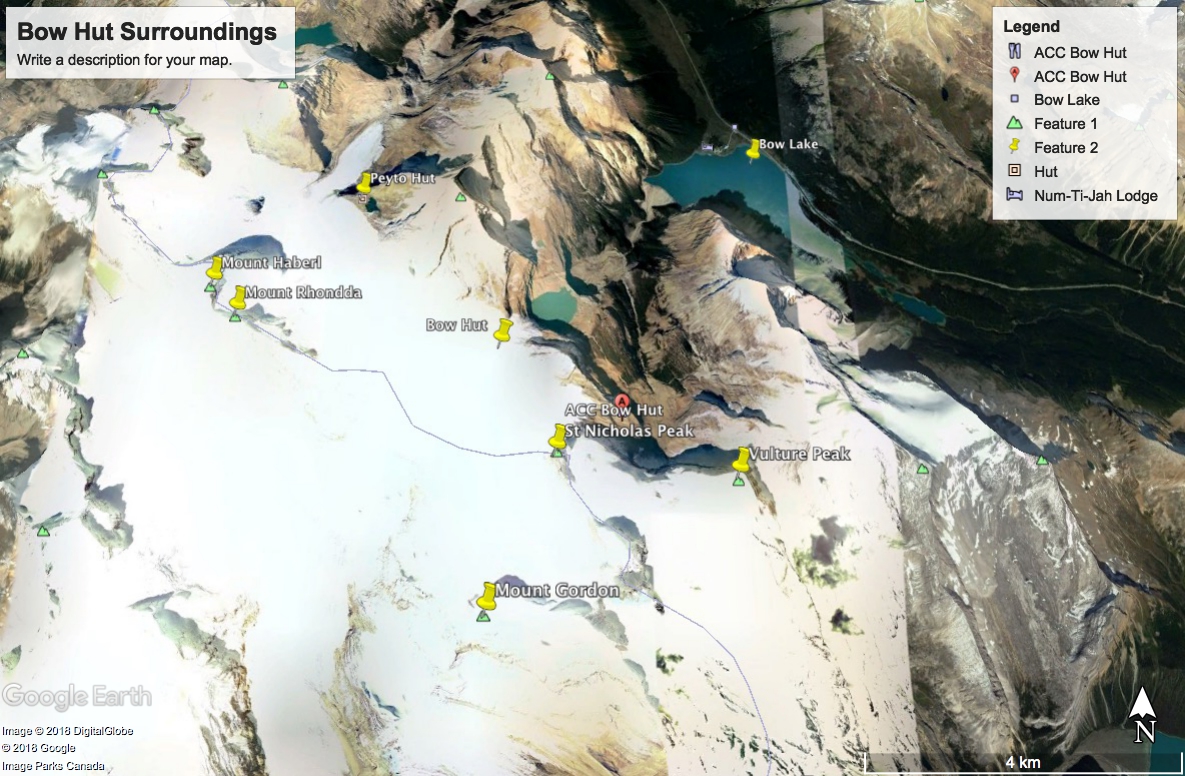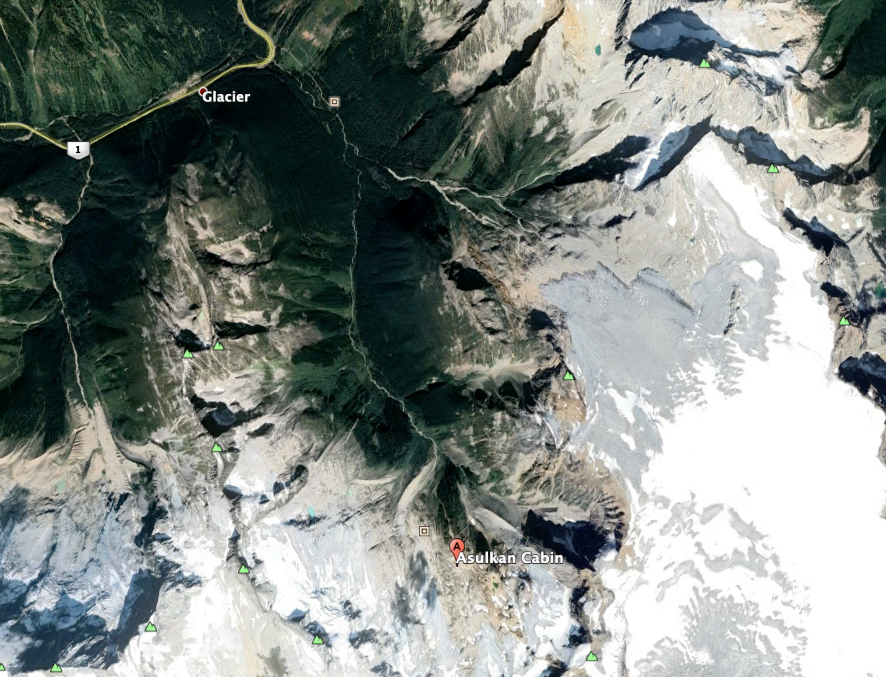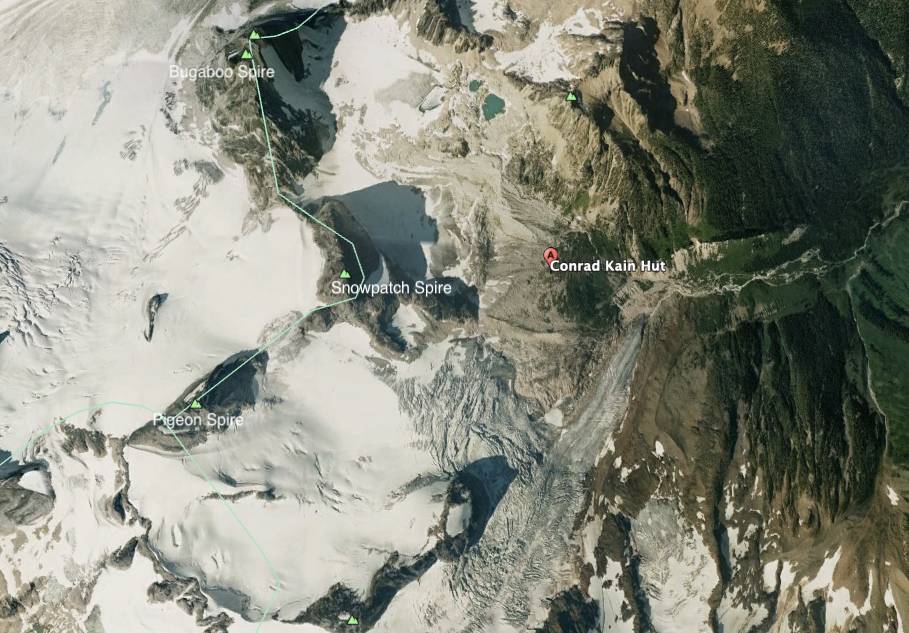- About the ACC
- Membership
- Huts
- Adventures
POLICIES & INSURANCE
- COMMUNITY
- Environment
- Shop
- Give
This season, we are expanding this program to include Rogers Pass, where the rustic Asulkan Cabin will be one of three basecamp locations for the course. Whether they’re the first summits of your mountaineering career or the first summits of your season, come join us at one of our three amazing locations for four days of skills training and peak bagging. You’ll learn new mountaineering techniques and knowledge and get hands-on practice applying what you’ve learned right away.
Interested in getting into mountaineering, but nervous about fitting in? Our BIPOC offerings are designed to provide an inclusive and welcoming space for all participants.
Each camp will take place in one of three strategically-located huts: Bow Hut, Asulkan Cabin, and Conrad Kain Hut. Each has their own selection of classic peaks ready to be bagged.

BOOKING INFORMATION
MORE INFORMATION
Please try to register online before calling. If you are having issues please try to have your emergency contact information and course questionnaire filled out before calling.
OR Call: (403)-678-3200 ext 213
Date:
JULY 2ND – 5TH, 2023
JULY 21ST – 24TH, 2023
Price: $1,300 + TAX
Date:
JULY 14TH – 17TH, 2023
Price: $1,500 + TAX
Date:
Cancelled
Price: $1,450 + TAX
The objectives of this camp are two-fold: first, teach you the skills to embark on your own independent alpine career, second, get you up some cool summits!
Skills covered include:
Climbing objectives on this course are grade II alpine climbs. They are snow and ice mountaineering objectives, involve a relatively straightforward glacier, and may involve some short sections of scrambling (either roped or unroped) to get to the summit. If conditions are favourable you can expect to be on the summit of some of the following peaks:
Evening 1:
Meet online at 7:00 PM (MST) for an introduction zoom session. Zoom link will be sent out about 1 week in advance of the camp. This will be around 1-2 hours and allow your guide to go over gear with you, make sure everyone is on the same page, make sure everyone knows where to meet for the next day and to answer any questions.
Day 2 – 4: Meet at the respective trailheads for Bow hut (Bow Lake Parking area), Asulkan Hut (Illicillewaet campground parking area), or Conrad Kain Hut (public lot near the Bugaboos Lodge) and hike into the hut. Explore the peaks in the area with overnights back at the Hut, see what a sample day could look like below.
Day 5: Maybe sneak in a final peak before lunch and hike back to trailhead.
A sample day on the camp:
Mountaineering means getting up early! Take advantage of the easiest and safest snow travel conditions. Enjoy a continental-style breakfast (food always tastes better when our porters carry it in to the hut for you) to give you the energy you need to start the day.
Rope up, and head up the toe of the Bow Glacier to the Wapta Icefield. From there, your destination (Mt. Olive) is only 3km away. Don’t be fooled by the distance, though: the 3km includes a walk over the icefield, 770m of elevation gain, and the crux: a short but steep snow section. To overcome all of these, you’ll put your new glacier travel and snow mountaineering skills to use. After you kick steps into the snow up the crux, self-belaying with your mountaineering axe, it’s a straightforward scree ascent to the top. Take in the view, relax, and enjoy your lunch.
On the way back, your guide will coach as you test out your new navigation skills. Practice identifying features on a topographic map and taking bearings off of the surrounding peaks to identify your position.
Back in the hut, you’ll have a chance to socialize with your fellow newly-minted mountaineers. Participants and guide will take turns in the kitchen following Covid protocols to prep meals and clean up.
In a short, hour-long evening instructional session, you learn how to create and follow a trip plan. The next day’s objective is introduced and discussed. Afterwards, everybody heads to the bunkroom to get some well-deserved rest.
Introductory
This camp is designed for those with little or no previous outdoor climbing or mountaineering experience and will help you get started and build your confidence. You should be familiar with the sport and have some experience climbing indoors, as well as must have a good level of fitness and be able to carry up to a 16 – 18kg (35 – 40lb) pack for several hours. This is not a course on climbing technique (although feel free to ask the guides for help) but rather a course on rope systems, safety and building confidence.
Food
Once at the trailhead, all of the logistics are taken care of to allow you to focus on the climbing. Porters carry your group’s food into the hut to keep packs light on the ascent. You can expect nutritious continental-style breakfasts, packed lunches and 4 course dinners with soup, appetizer, meat-based entrees (with vegetarian option) and a scrumptious dessert. Check out our sample menu for full details of catering on ACC Adventures camps and courses.
Accommodation
The Bow Hut is fantastically scenic, perfectly situated and is an excellent base for exploring further onto the Wapta Icefields in winter or summer. It is the easiest and most natural route onto the Wapta and gives access to the Peyto Hut to the north, and the Balfour and Scott Duncan huts to the south. The peaks of the Wapta are an attraction for summer mountaineering as well and many climbers have learned or honed their glacier travel and crevasse rescue skills within sight of the hut. The hut itself is bright, spacious and fantastically scenic. It is the largest, best equipped and most accessible of the four huts on the Wapta with a wood burning stove!
In 1972, the Alpine Club of Canada erected the Conrad Kain Hut (named after the renowned guide who first visited the area in 1910). From 1972 until 2000 the hut was maintained by BC Parks as a base for climbers and to reduce visitor impact on the fragile timberline area below Snowpatch Spire. The hut today is a modern, comfortable shelter for up to 35 people. It benefits from a local micro-hydro generator in the creek that supplies the hut with lighting, heat and hot water.
The Asulkan Cabin overlooks the beautiful Asulkan Valley. Welcoming hikers, skiers, and mountaineers year-round, the panabode style building sleeps 10 people at a time.
On each of the hut pages, you will find information on access, including driving directions, parking, and route descriptions.
Guiding
Our guiding ratio will be a maximum of 6:1 to give you plenty of one-to-one learning time with our excellent guides. The small groups also mean that you can split up based on objectives and pacing, and get the individualized attention needed to tackle more challenging alpine rock routes. The ACC hires guides certified by the Association of Canadian Mountain Guides (ACMG). Visit the ACMG website to learn more about what they do!

Rentals
If you don’t have everything on the gear list and aren’t ready to invest in your own, there are many awesome local businesses that rent out all of the equipment you will need. Be sure to reserve your rentals ahead of time to make sure everything you need is available for you when you need it.
“Our camp this year was led by Peter Amann, a long-time Alpine Club of Canada trip leader and guide who has also been chosen as the Patron for this year’s Mountain Guides Ball. We navigated our way over crevasses and onto ice slopes with some low-technical scrambling on our way to the summits of Mount Olive, Mount Gordon (for Canada Day!) and The Onion. It was a fantastic group and we lucked out with great weather save for one small shower on the way across the glacier on day three.”
“This was my first experience in the Rocky Mountains and the camp was a blast! By far my best Canada Day.”
“I enjoyed the great views, good laughs and new friends.”

ASULKAN AREA MAP

CONRAD KAIN AREA MAP

We sell Tugo® Travel Insurance suitable for both ACC Adventures and personal trips:
INCLUDED WITH YOUR CAMP FEE
PARTICIPANTS MUST PROVIDE
ORGANIZING FANTASTIC ACC ADVENTURES FOR OVER 100 YEARS
Input your search keywords and press Enter.